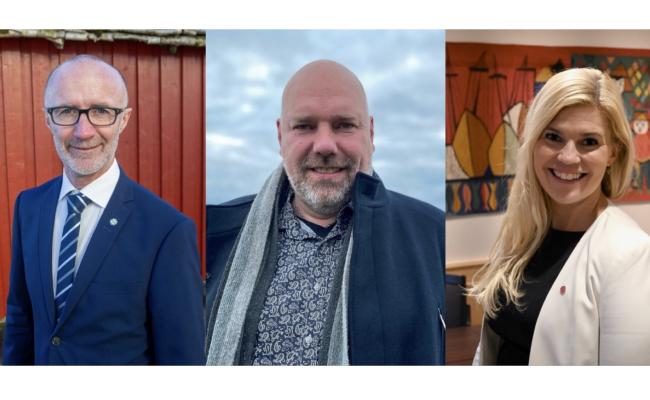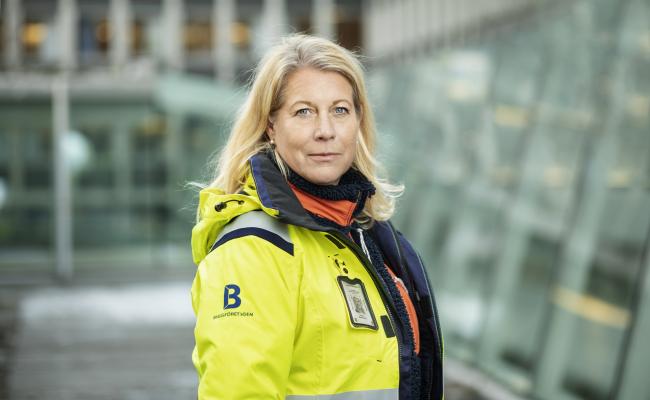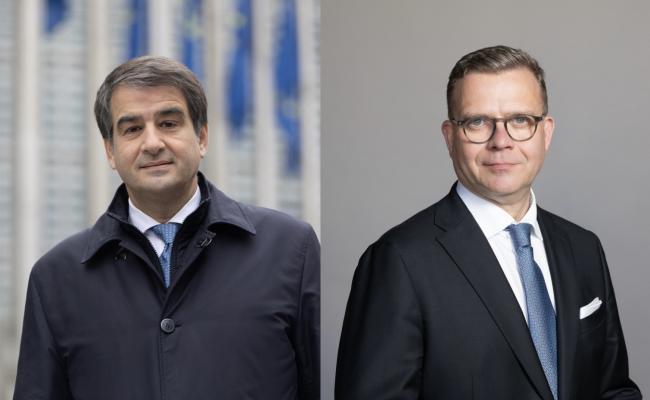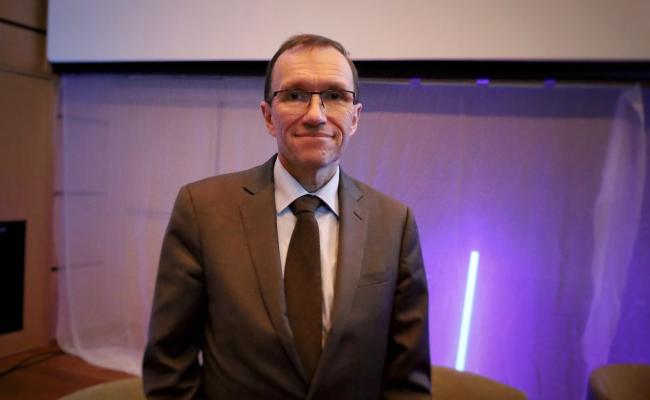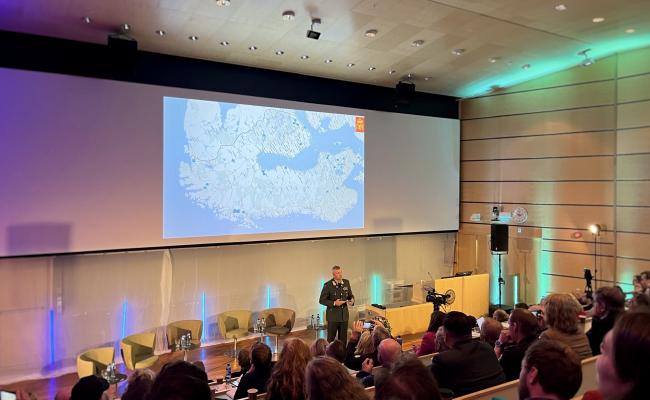Norway, Finland, and Sweden: Discussing New Cooperation Structure in the High North
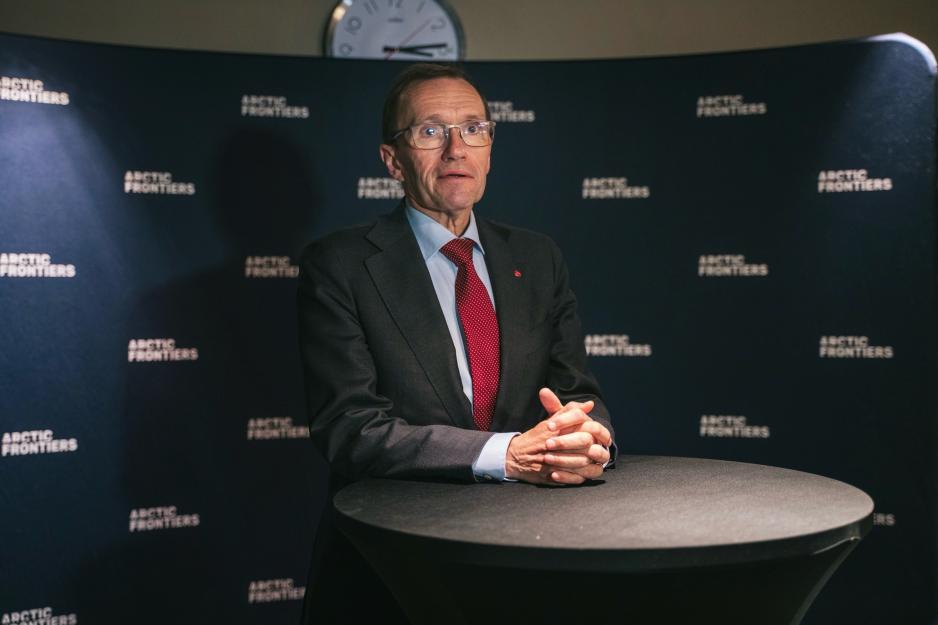
“The Barents cooperation, as we knew it, has changed quite fundamentally into something else, but what is now emerging in the northern Nordic region is very promising and constructive, says Norway’s Minister of Foreign Affairs Espen Barth Eide (Labor). (Photo: David Jensen/Arctic Frontiers)
Tromsø (High North News): State secretaries of Norway, Finland, and Sweden have been mandated to start designing a new framework for northern Nordic cooperation. "We have a shared interest in finding a joint answer to this," says the Norwegian Foreign Minister.
The Finnish government is currently developing a program to strengthen activity and security in northern Finland. One idea is to design a joint strategic agenda for the northern parts of Finland, Norway, and Sweden.
This is now in play between the countries, the Norwegian Minister of Foreign Affairs Espen Barth Eide (Labor) told High North News at the recent Arctic Frontiers conference in Tromsø.
“I greatly appreciate this interest from Finland, and this is not only a Finnish idea. We have been discussing for quite a while now how we can strengthen northern Nordic cooperation,” Barth Eide points out.
He refers to processes already underway for closer interaction at the Cap of the North in and around the defense sector, but also within academia, such as the university alliance Arctic Six.
“Now, Finland and Sweden are NATO members. We are all investing heavily in defense. With their accession to the alliance, of course, comes the need for new transport corridors, such as roads and other infrastructure, and with that in turn comes new opportunities for jobs and value creation,” says the foreign minister and continues:
“I believe very much in this North Nordic cooperation, and it is a very good thing that it is also high on the Finnish government’s agenda.
The Barents cooperation was a great initiative – a child of its time. But times have changed.
New framework underway
Designing a preferably specific strategic agenda for the northern Nordic region is one thing. Implementing it within an appropriate framework is another.
Finland announced this fall that it would leave the Barents Euro-Arctic Council after 2025. Is a new structure for Norwegian-Finnish-Swedish cooperation in the North under development?
“State secretaries from Norway, Finland and Sweden are, on their ministers’ authority, currently very much discussing how to answer this question. The Barents cooperation with Russia, as we knew it, was a great initiative – a child of its time. But times have changed, and we are now looking into what we will replace it with,” says Barth Eide.
He explicitly refers to his State Secretary, Maria Varteressian (Labor); Pasi Rajala (National Coalition Party), State Secretary for Finland's Minister of Foreign Affairs and Minister of Defense; and Dag Hartelius (Moderates), State Secretary in the Swedish Ministry of Foreign Affairs. They were all present at Arctic Frontiers in Tromsø.
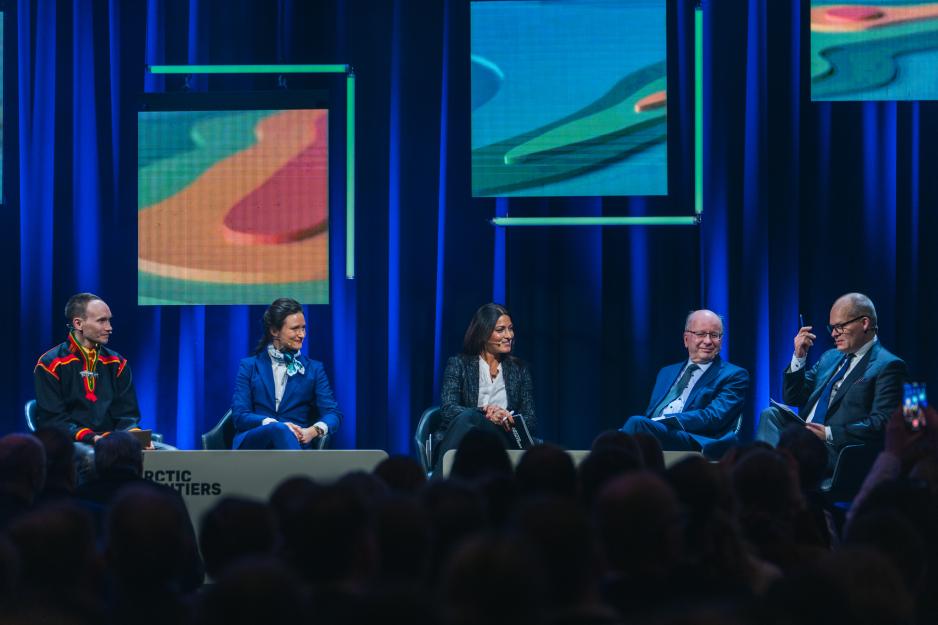
State secretaries who will discuss a new cooperation framework: Finland's Pasi Rajala (to the right), Sweden's Dag Hartelius, and Norway's Maria Varteressian (number two from the left) at Arctic Frontiers. (Photo: Vegard Stien/RAW Studios)
“To which extent will this replacement be built on what we had – and to which extent will it be new? I do not know now how it will be, but what I can tell you is that there is a mutual interest in finding a joint answer to that very good question,” the minister underlines.
It is important to create a new form of cooperation that includes both regional and national levels, the regional leaders in Northern Norway said to High North News this autumn.
Also read (the article continues below)
– A lot to learn from our Finnish friends
Adjacent to ongoing defense investments and relevant regarding more northern Nordic cooperation is the concept of total defense, which also encompasses civil preparedness and resilience, Barth Eide points out.
“In these areas, we have a lot to learn from our Finnish friends. I don't think there is a Finn who has ever believed that history could not repeat itself. So, they have continued to plan to be as robust as possible in the event of a new invasion scenario,” he says and continues:
“They stood on their own as a militarily non-allied, and now they are part of NATO. The Finnish experience offers many learning points for the rest of us, such as Norwegians and Swedes.”
Cooperation with Finland and Sweden on total preparedness
· "Finnish and Swedish NATO memberships provide new opportunities for military mobility and a strengthened Nordic cooperation within civil preparedness," reads the Norwegian total preparedness white paper launched by the Labor-Centre government on January 10th. (After the Centre Party exited the government on Thursday, Labor is now alone in governing Norway.)
· "The government will also work for increased cooperation with Sweden and Finland in the North to contribute to viable civil communities. Work on health and health preparedness is already underway in the Barents Euro-Arctic Council. The government will facilitate and support regional and local initiatives and areas of focus that support national efforts in civil security and preparedness," the white paper reads further.
The opportunities are enormous – and we must seize these.
Emphasis on potential
“I would also like to add one thing: When we are now expanding our cooperation, it is because there are no longer any restrictions as all three countries are members of NATO and the EU or the European Economic Area,” Barth Eide emphasizes.
“We are trading partners and close in many ways. For example, we have an integrated energy system, which is one of the oldest in the world. All obstacles are gone, the opportunities are enormous – and we must seize these,” he states.
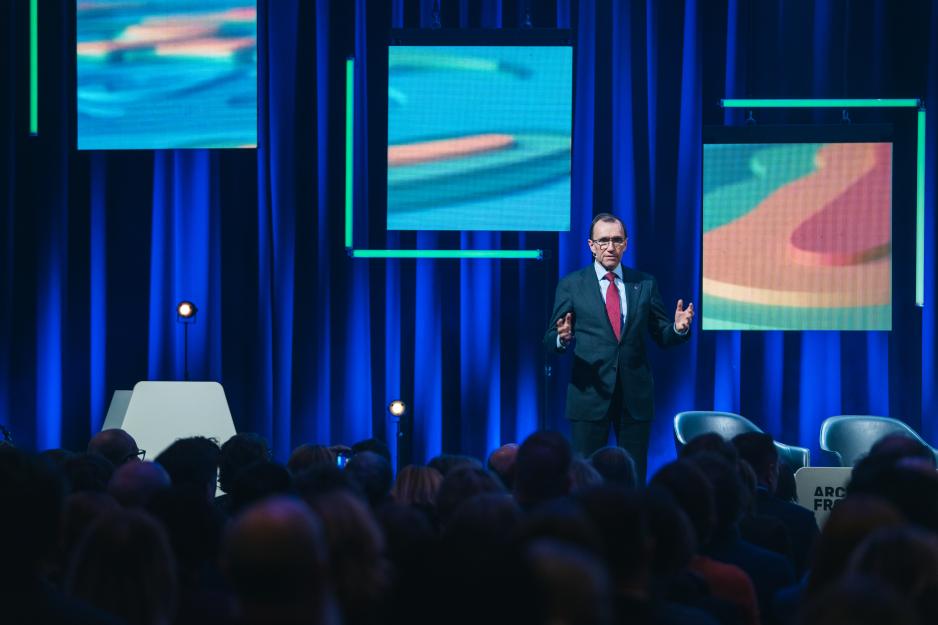
The Norwegian Minister of Foreign Affairs Espen Barth Eide spoke at the Arctic Frontiers conference during a session titled "Arctic State of Affairs." (Photo: David Jensen/Arctic Frontiers)
Thank God that we agree on where the borders are between us.
In the bigger picture
On stage during Arctic Frontiers, the minister also places the Norwegian-Finnish-Swedish border-crossing cooperation in the North into a larger context:
“We got a different future in the Arctic than we thought. We are in darker times. We have also had some surprises. I have learned the word ‘manne,’ the Northern Sámi word for ‘why,’ which is relevant in relation to the discussion about Greenland [ref. Trump's statements, ed note], says Barth Eide in his speech and continues:
“An important insight into foreign and security policy, as I see it, is that in order to go beyond borders – which is this year’s title for this conference – it is important to have clear borders as a foundation.”
“Now, there is a lot of emphasis on how the northern parts of Norway, Sweden, and Finland can cooperate more closely. There are new opportunities that we are now developing together with the Finns and Swedes in our part of the Arctic. Thank God that we agree on where the borders are between us, he underlines.
Also read (the article continues below)
We must be prepared, resilient, and active.
The Finnish perspective
The aforementioned state secretaries spoke less specifically about the development of northern Nordic cooperation when they also participated in the "Arctic State of Affairs" session.
At the same time, Rajala and Hartelius' more general remarks provide some insight into our neighboring countries' approaches to trilateral cooperation across the Cap of the North.
“What has not changed in the Arctic is the necessity to combat climate change and to prioritize the people living in the region. Similarly, there is a necessity to work on the economy and infrastructure,” says the Finnish State Secretary.
Rajala believes that the change lies in the intensified competition for the region. Russia and China are in a kind of marriage of convenience that the US is "clumsily" trying to counter (ref. Greenland), he points out – and notes that Finland, Norway, and Sweden are among those who find themselves in the middle of this tug-of-war.
“Going forward, it is important that we strengthen our presence as NATO allies in the region; increase our visibility and develop our capabilities to ensure that the neighborhood is strong. And that we use the instruments that we have, including the Arctic Council, to avoid unintended consequences. To ensure that we do not make any mistakes, Rajala says.
“We must stand our ground, be prepared, resilient and active – both militarily and economically," he also emphasizes.
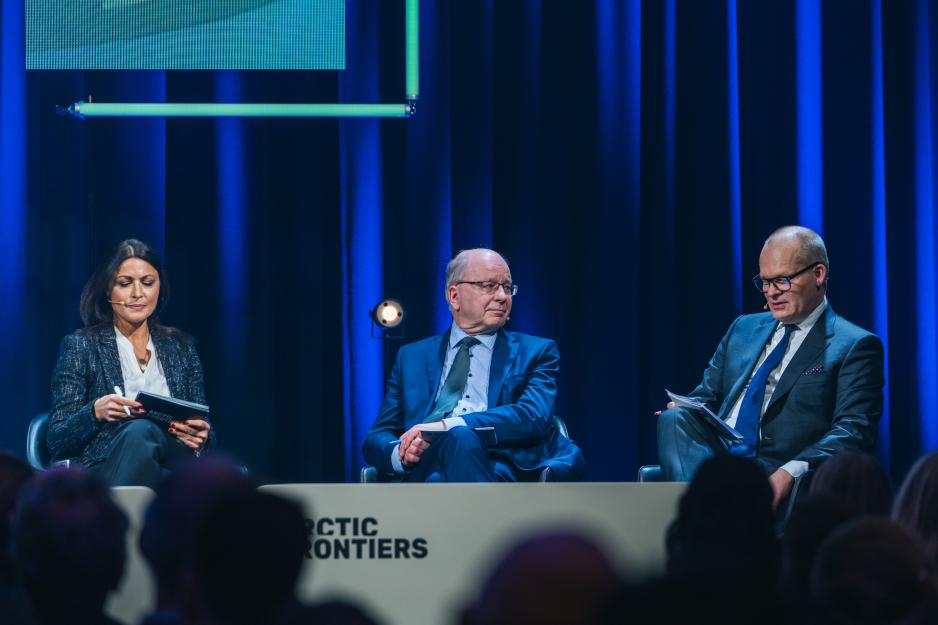
Offered the perspectives of neighbors in Tromsø: Dag Hartelius (left), State Secretary at the Swedish Ministry for Foreign Affairs, and Pasi Rajala, State Secretary to the Finnish Minister of Foreign Affairs and the Minister of Defense. (Photo: Vegard Stien/RAW Studios)
These are opportunities, this is growth.
With Swedish eyes
The state secretary from Sweden reminisced about when he had a stopover in Tromsø while on the way to Kirkenes nearly 32 years ago.
“We [representatives of Sweden, Norway, Russia, Finland, Denmark, Iceland, and the EU Commission, ed. note] gathered there to establish the Barents Cooperation. The atmosphere was characterized by optimism and hope. Now, we are facing serious challenges, primarily Russia's war against Ukraine,” says Hartelius.
But sitting still and wallowing in the gloom does not help, he says and adds that we should also direct our gaze toward positive tendencies, even if they are few.
“I would argue that Finland and Sweden's accession to NATO is such a positive trend because it increases security in the region. The enlargement of NATO will also bring investments into civil society as we need to build infrastructure – and connect Norway with Finland through Sweden. These are opportunities, this is growth.”
Hartelius also believes in the Swedish, Finnish, and Norwegian economies and the will to sufficiently invest in infrastructure, in addition to the booming defense budgets:
“All these countries are quite prosperous. We have to fulfill our obligations as NATO members. And if you ask someone in Sweden the question, ‘What about our own north?’, the answer 20 years ago would have been pessimistic. But now the region is flourishing: there are large investments in mining linked to Europe’s economic security and an emphasis on innovation. This gives reason to be an optimistic realist.”



